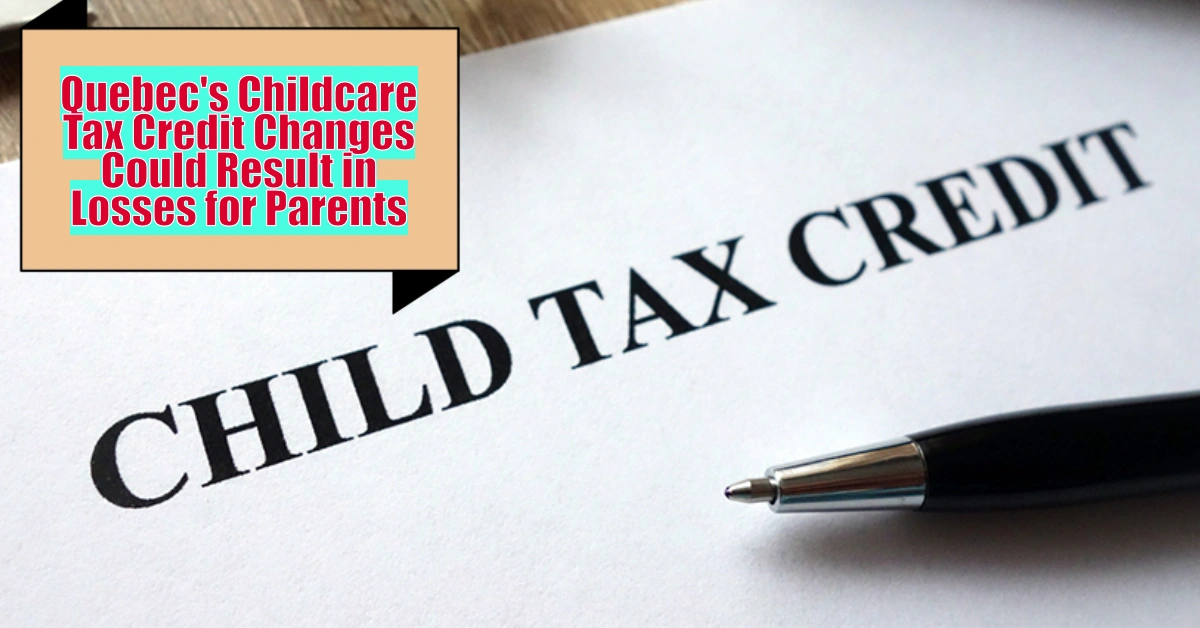Quebec’s new budget for the fiscal year 2025-2026, announced on March 25 by Finance Minister Eric Girard, brings a range of significant financial shifts, particularly for parents who rely on the childcare tax credit. With the province grappling with a record deficit of $13.6 billion, the government is making some tough choices, one of which includes reducing the scope of the popular childcare tax credit program. These changes could affect many families in Quebec, especially those with children aged 14 to 16.
Table of Contents
The Major Change: Lowering the Age Limit for Eligible Childcare Tax Credit
One of the most noteworthy modifications in this year’s budget is a reduction in the maximum eligible age for the refundable childcare tax credit. Starting in 2026, the maximum age will drop from 16 years old to 14 years old, with certain exceptions. According to the government, this change is part of an effort to better align the tax expenditures with “new economic and social realities.” This reduction is expected to save the province approximately $55.1 million over the next five years.
The aim of this adjustment is clear: to shift focus and tax assistance toward families with younger children. This means parents who have children between the ages of 14 and 16—those who previously qualified for the tax credit for certain childcare-related expenses—will see a reduction in eligibility, primarily impacting those who pay for summer camps, day camps, and other related services.
What Childcare Expenses Are Affected?
For families that have relied on the tax credit for a variety of childcare expenses, the changes in eligibility criteria could lead to a notable impact on their financial planning. The childcare tax credit in Quebec covers a range of services, including daycare fees, certain school-based childcare programs, and services provided in home-based settings. However, with teenagers no longer attending early childhood centers or typical daycare services, the new changes will primarily affect parents who pay for summer camps, boarding schools, and day camps for children aged 14 to 16.
Here’s a breakdown of the current tax credit amounts for eligible expenses:
- $200 per week for a child aged 6 or younger
- $275 per week for a child with a severe and prolonged mental or physical impairment (regardless of age)
- $125 per week for any other child aged 6-15 (soon to be under 14)
For parents of teenagers between 14 and 16, those payments for camps or similar services that once qualified for the tax credit will no longer be eligible, making it a significant adjustment for families relying on this assistance.
Major Social Welfare and Tax Changes in 2025: Cash Boost for Thousands of Households
Are You Eligible for the Solidarity Tax Credit? Find Out What You Could Be Missing!
Can You Qualify for the Canada Workers Benefit in 2025? Here’s A Complete Guide
Government Benefit Cheques Coming in January & February 2025
How Will These Changes Help Address Quebec’s $13.6 Billion Deficit?
The budget for 2025-2026 comes in the wake of a historic $13.6 billion deficit, representing approximately 2.2% of Quebec’s GDP. The total government spending for this year is projected to be $165.8 billion, which includes $156.1 billion for government operations and $9.7 billion allocated for debt servicing. As part of the government’s broader plan to manage this deficit, reducing the scope of the childcare tax credit is one of the steps being taken to limit spending.
While the government claims this is necessary to stabilize the province’s finances, it remains to be seen how these changes will affect the financial wellbeing of families with older children. Parents who depend on the tax credit to cover the costs of child care and extracurricular activities for teenagers will have to adjust their budgets accordingly.
What Should Parents Do Now?
Parents who may be impacted by these changes should start planning ahead. It’s important to review the updated eligibility requirements and assess how the reduction in the childcare tax credit could affect their finances. If your child is between the ages of 14 and 16 and you rely on the tax credit for summer camps or day camps, now is the time to look into alternative ways to offset these childcare costs.
In conclusion, while the Quebec government’s new budget aims to address the province’s financial challenges, these changes to the childcare tax credit represent a shift that could have a significant impact on many families. Parents should be proactive in preparing for these adjustments and seek out any other available support programs to help manage the increased financial burden.

